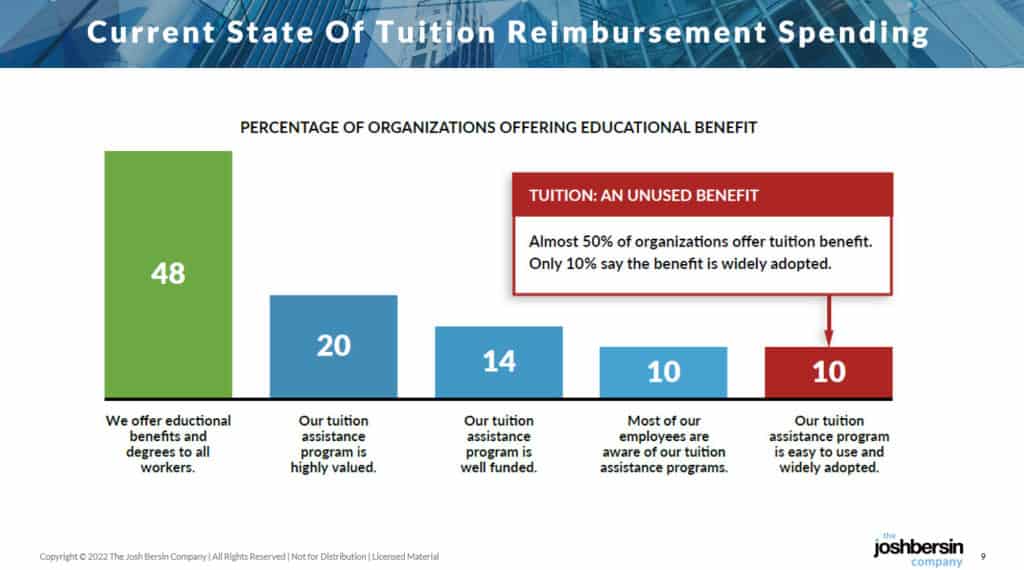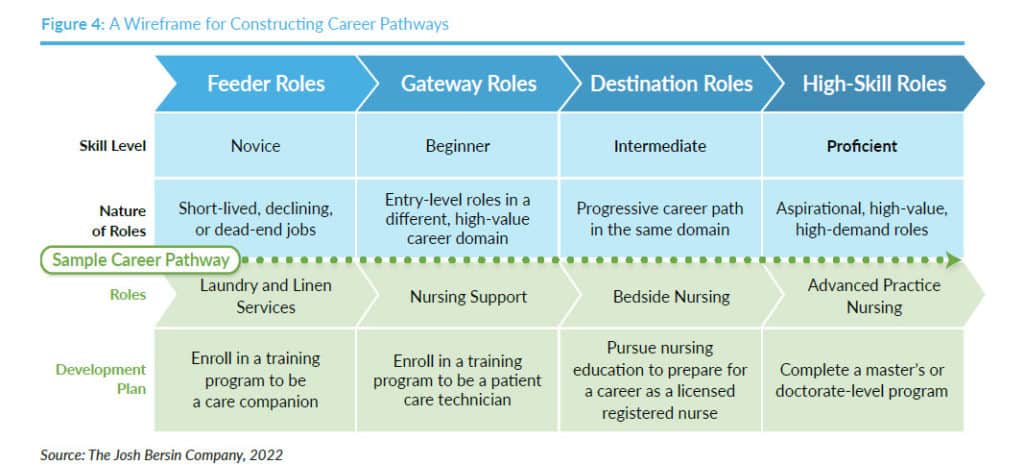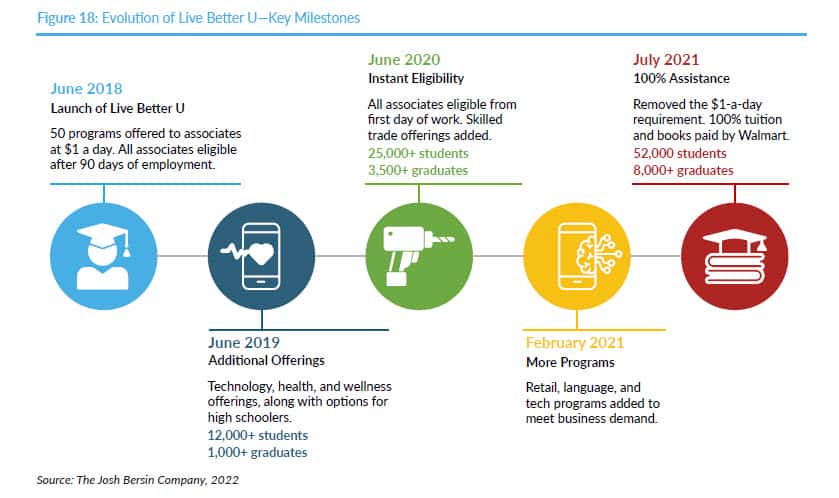Career Pathways: An Innovation That Could Transform The Economy
We just released new research on Career Pathways, a bold corporate innovation that creates non-linear career paths for workers with any education. This approach, which has been pioneered by companies like Walmart, Amazon, Mercy BonSecours, and others, has the potential to transform jobs, companies, and the economy. (More details here.)
But first, let me give you some background.
College education in the United States has gone through a revolution. In 1944 the US Congress passed the GI Bill, which paid for veterans to obtain a fully funded college education. This program, supplemented by many state governments, gave birth to a massive increase in college degrees. Many historians believe that much of the US economic growth in the 1960s, 70s, and beyond was created by the engineers, scientists, and business people who benefited from this bill.
Since then, however, starting with Ronald Reagan, the US education system has been privatized. Today only 37% of Americans have a college degree and the original idea, that of a “liberal arts education” to help you learn to contribute to society, has largely fallen away. Today we have high priced private and public colleges (the University of California itself has become almost as difficult to get in as Stanford or Harvard, and costs $14,000 for California residents and $44,000 for non-California residents). This, coupled with a somewhat predatory student loan system, has resulted in $1.7 Trillion in US student debt.
Employers, however, still need educated workers, so the education system has adapted. Not only have all sorts of unscrupulous “diploma mills” (profit-seeking colleges) been created, we have thousands of private companies selling technical skills programs, nursing and apprenticeship programs, bootcamps, and other types of skilling offerings. Community colleges, one of the biggest successes in the US, continue to educate millions of young people at a modest cost, often leading them to better jobs or a less expensive four year degree.
I, for one, still believe in a liberal arts education, by the way. And my argument is not at all political: I know that the two most in-demand skills in business are “communications” and “critical thinking,” and I believe that these skills are developed through education, reading, academic discussion, and a healthy respect for science. But let’s put that aside.
As all this privatization and price increase has occurred, employers have been increasingly frustrated. While companies love to hire college grads (they are proven “system thinkers” and often have many technical skills), they recognize that it’s a limiting, sometimes discriminating policy. So they have reduced the requirement for a four year degree (IBM, Apple, Tesla, Google, and others no longer require a degree for many jobs). They offer technical education and job training to fill the gaps.
But the big spend is on Tuition Reimbursement. Thanks to US tax law, employers can offer up to $5,250 in tax free benefits to workers for accredited education, opening up the floodgate to more than $28 billion in spending. And we’ve studied these programs: they’re generous, extensive, and offered by more than 70% of large companies.
The problem is, as I discuss in this week’s podcast, they don’t really deliver on the goods.
 |
Why does this take place? Quite simply most companies look at tuition reimbursement as a “benefit,” not a strategic development program. So a whole new idea is now taking hold.
Enter Career Pathways
Instead of letting employees shop around for courses, pay for them, and get reimbursed by HR, what if the company itself created an “Education Assistance” and “Career Academy” for its employees, focused on the jobs, careers, and promotion opportunities within? This idea, which was pioneered around 2016 by Walmart, has now become a huge opportunity in business.
As our research describes in detail, companies like Walmart, Amazon, Mercy BonSecours, Rocket Central, Providence, and hundreds of others have now built explicit Career Pathways to help employees gain educational credentials, skills, apprenticeships, and new jobs. These non-linear programs (we coined the phrase Career Pathway to differentiate from traditional linear functional Career Paths) deliver life-transforming opportunities to individuals and help companies fill massive talent gaps.
A “career pathway” is a series of career steps, designed through skills adjacencies, which show an individual how to move to a more valued, in-demand career. Through career pathways, organizations can support the development of new skills, helping individuals transition into credentialed new jobs or roles that offer better pay and business impact. Unlike “career paths,” where people move within a cluster of jobs using their existing skills, career pathways enable organizations to tap into diverse talent pools—such as frontline workers and underserved populations. And by reskilling and developing new skills, career pathways also unlock growth.
Let me show you an example. This Career Pathway, developed by Mercy BonSecours, was carefully designed to bring hourly, non-degreed workers into highly paid, credentialed roles which the hospital network badly needs.
 |
Once this framework is created, the company works with providers like Guild Education or EdAssist by BrightHorizons to build out an entire program.
Walmart’s program, which is now called Live Better U, has been spectacularly successful, delivering more than 10,000 degrees to its associates and promoting thousands of people into better jobs.
 |
Career Pathways Take Effort
While these are spectacularly successful programs, they take effort and strategic investment to work. I first met with Walmart in 2016 as they were starting their program, and over the last six years it has grown in depth, sophistication, and focus. Companies like Rocket Central, which started with a technical academy, later find that they need detailed skills development, a multitude of education partners, coaching, and on-the-job training as well.
And this is why I see this as a massive innovation in the economy.
Every company we talk with is trying to build it’s skills taxonomy, new capability models, and Capability Academies for in-demand roles. They are buying talent marketplace platforms, investing in online coaching networks, and learning to understand what we call Growth in the Flow of Work. But where is all this going?
Ultimately these programs are here to match individuals with the jobs, careers, and opportunities they seek. And that means many of these employees also need education, degrees, certificates, and basic skills. No L&D department can replicate the vast offerings in the education sector. Career Pathways bring this all together, letting you as an employer efficiently and effectively use tuition reimbursement dollars (and other L&D investments) to directly move people into better, in-demand jobs.
As I talk about in the podcast, this can become a strategic competitive advantage for your company. Healthcare providers, retailers, manufacturing, and distribution companies desperately need skilled workers, and these Career Pathways fill the gap.
But even better, this is a way we can make life better for our employees. Career Pathways give individuals inspiration, hope, and better standards of living – something every business wants to deliver.
For more details on these programs and the strategies under the cover, please contact us and join our corporate membership program.
Additional Resources
